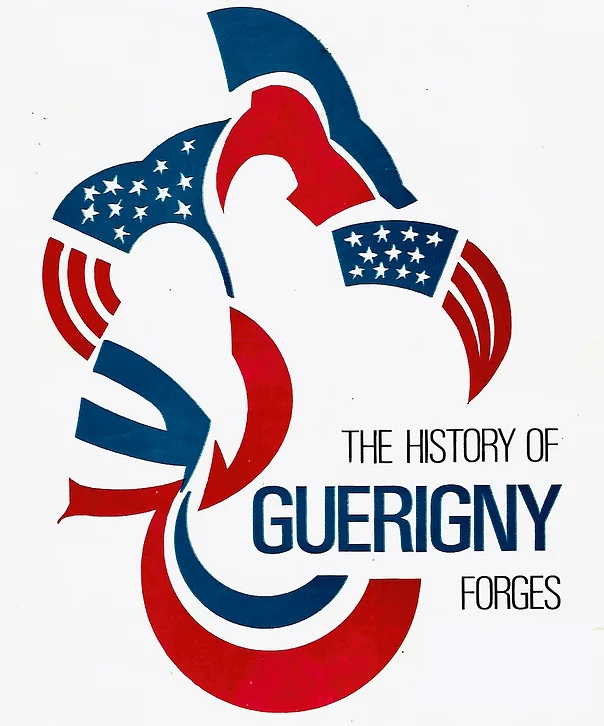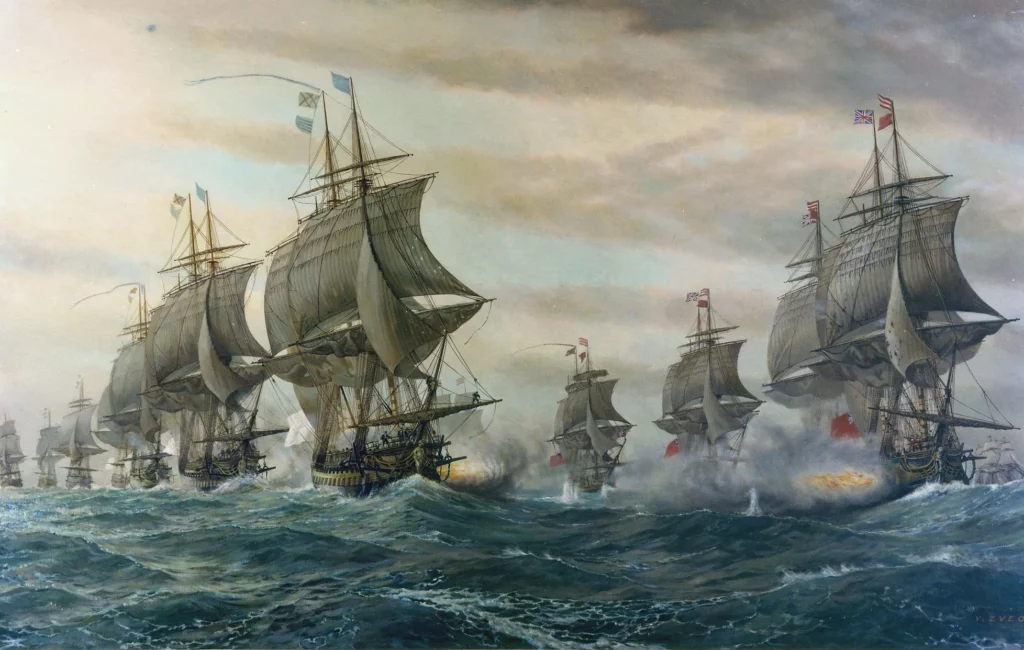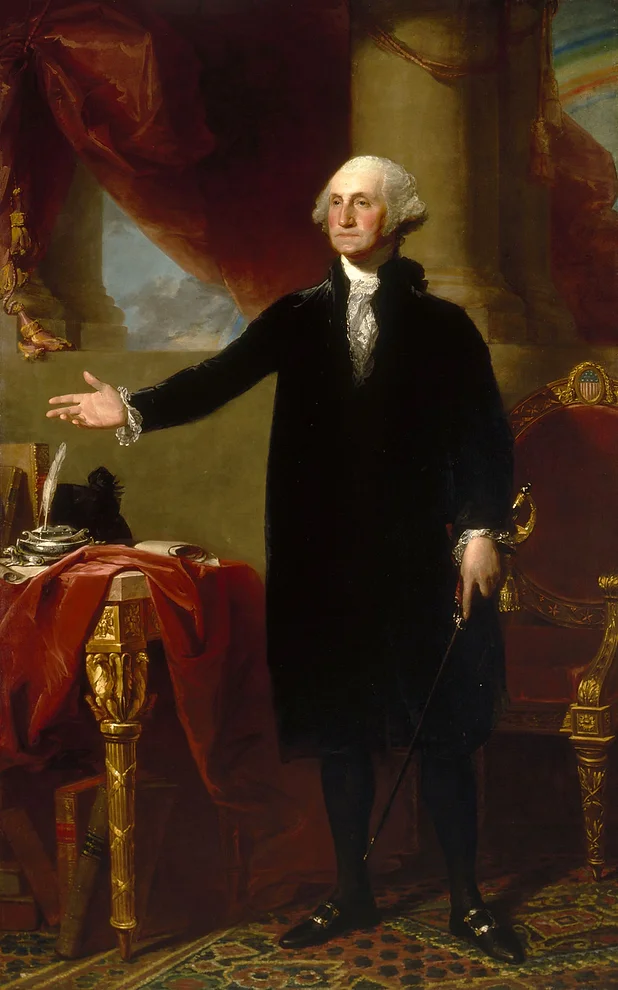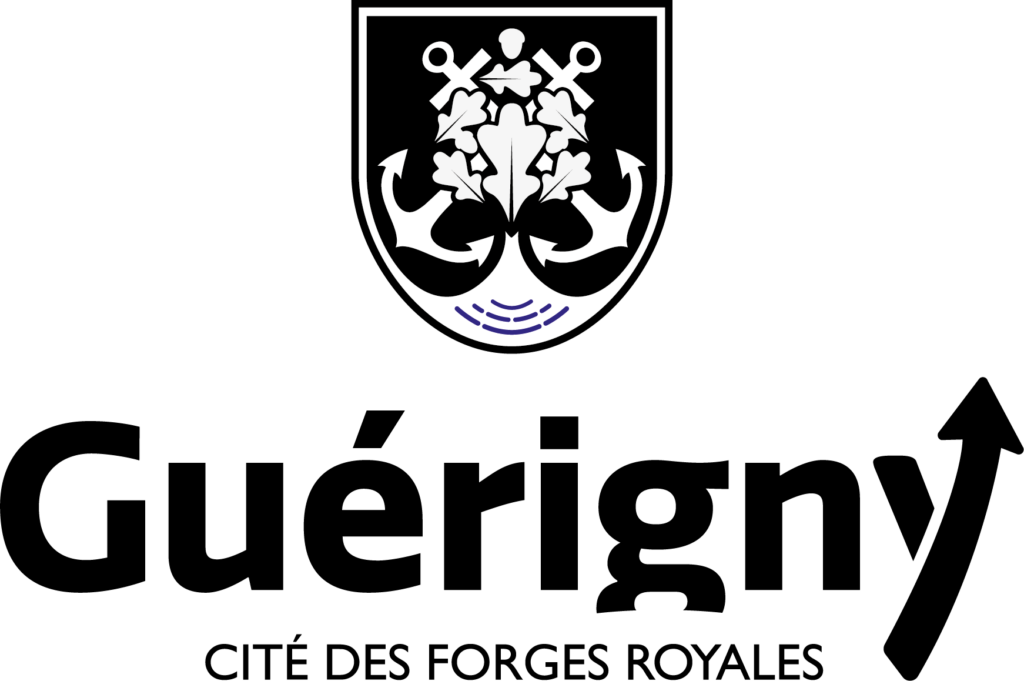

The United States War of Independence, or American War of Independence, opposed the Thirteen North American colonies to the Kingdom of Great Britain from 1775 to 1783.
The rebellious American settlers were called by the British « Insurgents » or « Patriots ». The American War of Independence was one of the processes of the American Revolution that allowed the United States to gain independence and build republican institutions. It was a milestone in the history of the country and, in turn, of Canada, with the forced expulsion of 50,000 loyalists to the British crown to this country, which at that time included a population with a large French-speaking majority (about 90,000 Francophones based mainly in Quebec). From 1777 on, the war led to the intervention of other European powers, including France under La Fayette.

The Battle of Chesapeake completes the isolation of the English army entrenched at Yorktown (1781)
US Navy Naval History and Heritage Command Wikimedia Commons
In 1781, from April to September, the French fleet cruised the West Indies, keeping the British fleet away from the American coast. At the request of Generals Washington and La Fayette, Admiral de Grasse, leading the French fleet, sailed to Chesapeake Bay on 5 September 1781, bringing the necessary reinforcements for the attack on Yorktown by the « insurgents ». This intervention was crucial and determined the victory of the young United States over the British Empire, as evidenced by letters from Washington to de Grasse (French Institute of Washington 1931). The fleet entrusted to de Grasse consisted of 48 vessels equipped in Brest in a record time of two months. At that time the Forges de la Chaussade, whose main factory was located in Guérigny, was the most important supplier of iron parts for the Navy, such as anchors, mast collars, armor plates, cannon balls … (Download The key role of the “ Royal forges of Guerigny ” in the American war – French and english).

Document en français & en anglais, détaillant le rôle crucial de Guérigny dans la Guerre d’indépendance des Etats-Unis d’Amérique
To his Excellency Count de Grasse
Heed Quarters 15th May 1783
« Sir: I have been most agreeably surprised and gratified by the receipt of your Excellency:s Letter of the 28th of January fast – which Ihad the pleasure to obtain a few days ago-
The friendship which I had the Happiness to contrect with ‘vou my Dear General,at our Operations in Virginia, has never been ebeted in my Mind, and will remain a pleasing & constant Companion of my future Lite-
Whether I shall have it in my power to renew my Affection for your Excellency by embracing you in Europe, I cannot at present declare – But should I ever have the heppiness of meeting you again, either in Europe or America, you may be assured, I should place the Event among the most fortunate Circumsterices of my Life-
You will permit meto return.vou my warmest & most sincere Congratulations on the happy Termination of the War-an Event most favorable to America, and most glorious to the generosity & Disinterested Bravery of your Nation; by whose kind Intervention, the United States have been led by the Hand, to independence & a Station among the Nations Midst the many obligations this Country is under to the Gentlemen of the french Army & Navy, who have barn so noble à Shere in our Establishment, the Part you have acted in this great Drama, will be deeply recorded in the Minds of her Sons, in Characters of indelibte Gratitude & Veneretion-
« … I am with the most perfect Affection, and with Sentiments of the highest Esteem & Attechment
My Dear General
Your most Obedtent & most humble Serv »
G. Washington
Extrait de : Correspondence of General Washington and Comte de Grasse (Edité par L’INSTITUT FRANÇAIS DE WASHINGTON)

A son Excellence le Comte de Grasse
Quartier Général, le 15 Mai 1783 « Monsieur : J’ai été très agréablement surpris et reconnaissant de la lettre de votre Excellence datée du 28 Janvier dernier que j’ai reçue avec plaisir il y a quelques jours.
L’amitié que j’ai eu le bonheur de partager avec vous, mon cher Général, pendant nos opérations en Virginie, n’a jamais diminuée dans mon esprit et sera un agréable et constant souvenir jusqu’à la fin de ma vie.
N’importe comment il reste en mon pouvoir de renouveler mon affection à votre Excellence en vous embrassant en Europe, je ne peux pas dire quand, dès maintenant, mais aussitôt que j’aurai la joie de vous retrouver à nouveau,soit en Europe soit en Amérique, vous pouvez être sûr que je compterai cet évènement parmi les plus heureux de ma vie.
Permettez-moi de vous retourner mes plus chaleureuses et sincères félicitations pour l’heureuse fin de la guerre, un évènement des plus favorable à l’Amérique et le plus glorieux pour la générosité et la bravoure désintéressée de votre nation; par votre intervention efficace les Etats-Unis ont été conduits à l’indépendance et ont pris place au sein des Nations.
Parmi les nombreuses obligations que ce pays doit aux officiers de l’armée et de la flotte française, l’aide si noble qu’ils ont apportée à notre implantation; la part que vous avez prise dans ce grand drame, seront profondément gravées dans les esprits de leurs fils en caractères d’indélibile gratitude et vénération.»
« … Je suis avec l’affection la plus parfaite, et avec les sentiments d’attachement et l’estime la plus haute,
Mon Cher Général,
Votre très obligé et très humble serviteur. »
G. Washington
Extrait de : Correspondence of General Washington and Comte de Grasse (Edité par L’INSTITUT FRANÇAIS DE WASHINGTON)
